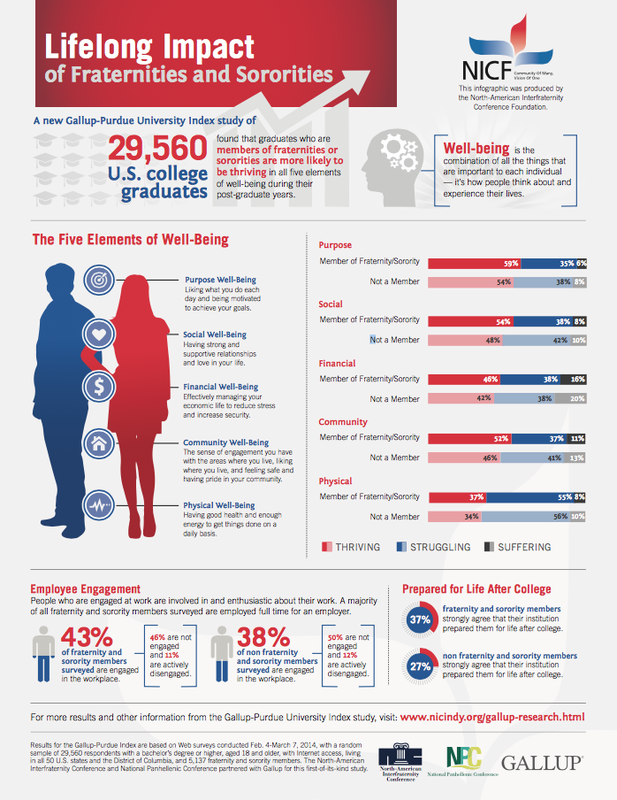A 2014 Gallup study found "graduates who participated in fraternities or sororities are slightly more likely to thrive in all five critical elements of well-being — purpose, social, financial, physical and community — than are graduates who did not participate in fraternities or sororities."
| National Gallup-Purdue Index Reveals Improved Well-Being Among U.S. College Graduates Who Joined Fraternities and SororitiesWhen it comes to being engaged at work and experiencing high well-being after graduation, a new Gallup-Purdue University Index study of U.S. college graduates found that graduates who are members of fraternities or sororities are more likely to be thriving in all five elements of well-being during their post-graduate years than those graduates who did not join a fraternity or sorority. The study revealed that respondents identifying themselves as members of fraternities and sororities – 16 percent of respondents indicated that they were a member of a national fraternity or sorority while attending college – scored better in overall well-being, workplace engagement, collegiate support, experiential learning and alumni attachment. |
Graduates who participated in fraternities or sororities are slightly more likely to be thriving in all five critical elements of well-being – purpose, social, financial, physical and community – than are graduates who did not participate in fraternities or sororities.
Workplace Engagement
National results show that 43% of college graduates who were members of a fraternity or sorority are engaged in the workplace, compared to 38% of college graduates were not members of a fraternity or sorority.
Support
The support that graduates recall receiving from their institution as students is also important well into their post-graduate careers. 16% of graduates who participated in fraternities or sororities and who say they had a professor who cared about them as a person, one who made them excited about learning, and had a mentor who encouraged them to pursue their dreams are emotionally attached, compared with 13% of graduates who did not participate in fraternities or sororities.
Experiential Learning
Similarly, graduates with fraternity or sorority affiliation and membership in college were more likely to have taken advantage of experiential learning opportunities while in college (11%) than graduates who were not members of fraternities or sororities (5%).
Alumni Attachment
Alumni who participated in fraternities or sororities exhibit higher emotional attachment to their school. 22% of those who were in sororities or fraternities are attached, compared with 17% who were not members of sororities or fraternities.
RED MORE: Gallup Research


 RSS Feed
RSS Feed
